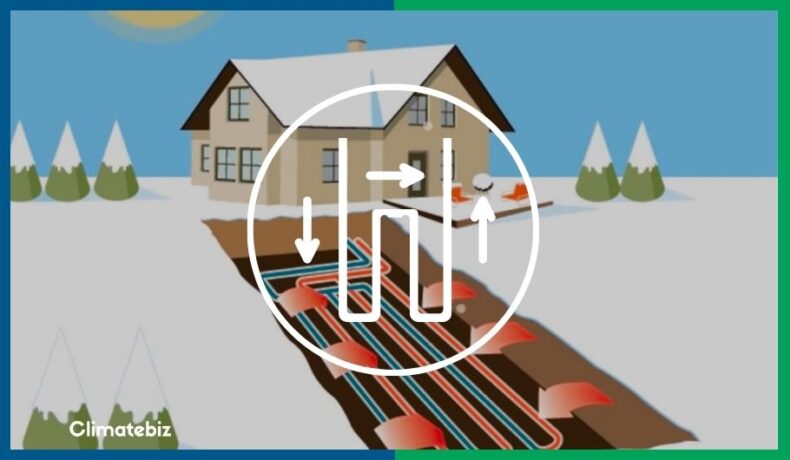Geothermal heat pumps are a great way to decrease your heating and cooling energy consumption. What’s more, the lifespan of a geothermal heat pump is the same as a conventional HVAC.
Your geothermal heat pump lasts as long as a standard HVAC system but uses less power. Geothermal heat pumps use up to 50% less energy than your typical system and 44% less than an air-source heat pump.
However, the initial investment is more significant than your standard heating methods. While it will save you money in the long run, it’ll cost a penny to install. So, how can you prolong the geothermal heat pump lifespan to get more value for your money?
Table of Contents
How Long Does A Geothermal Heat Pump Last?
A geothermal heat pump’s lifespan is generally 20 – 25 years. It’s a good investment since it lasts as long as a conventional system yet uses less power.
Multiple factors increase your geothermal heat pump lifespan, which we’ll dive into later.
But before we look at that, let’s cover the basics. There are several concepts you need to understand before you can maintain and prolong the lifespan of your heat pump.
For instance:
- What is a heat pump?
- How does it work?
- What factors influence the lifespan of a heat pump?
- How can you preserve it?
What Is A Geothermal Heat Pump?
A geothermal heat pump takes advantage of the earth’s temperature to warm your home. The system absorbs the warmth from the ground and releases it into your home.
It’s a well-known fact that the temperature of the earth is constant. Today, the soil’s temperature can be anywhere between 45°F (7°C) and 75°F (21°C). It’s also clear that the ground has warmed over the years and will continue to do so. This makes geothermal energy a vast resource that has barely been touched.
Due to thermal mass, the ground retains heat, only releasing it when it’s in contact with a colder substance. The heat is transferred in two ways – conduction and convection.
Heat Transfer: Conduction
Simply put, conduction is when two substances touch, and heat is transferred from one to the other. This is due to the moving molecules bumping into each other and sharing their kinetic energy.
An example is when a flame heats up a metal rod — the heat is transferred by conduction.
In heat pumps, the ground warms up the pipes that contain water. This warm water is then transported to your home, where it then transfers the heat by convection.
Heat Transfer: Convection
Convection is when heat is transferred through water molecules. When the water molecules gain kinetic energy, they collide, warming the water.
The heat from the water can then be transported around the home through radiators and into a heat exchange.
Types Of Geothermal Heat Pumps
There are four main types of heat pumps, and we’ll look at each one. They are:
- Closed-loop systems
- Open-loop systems
- Lake systems
- Hybrid systems
Closed-Loop Systems
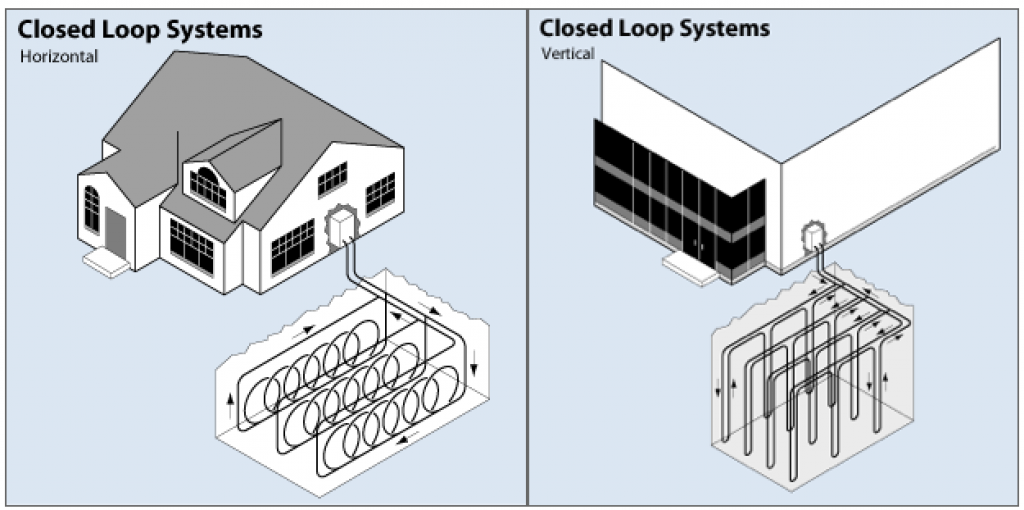
Source: fenleynicol
A closed-loop heat pump is your most common and rudimentary system. Pipes are placed underground and are often in coils to save space. There, the heat from the soil is transferred into the tube.
Water is pumped through the pipes, down into the ground, and back up again. When the warm water reaches your home, it goes through an exchange where it loses its heat. The cold water then flows back down the process repeats.
It’s called a closed-loop system because the water does not leave the pipeline.
Open-Loop Systems
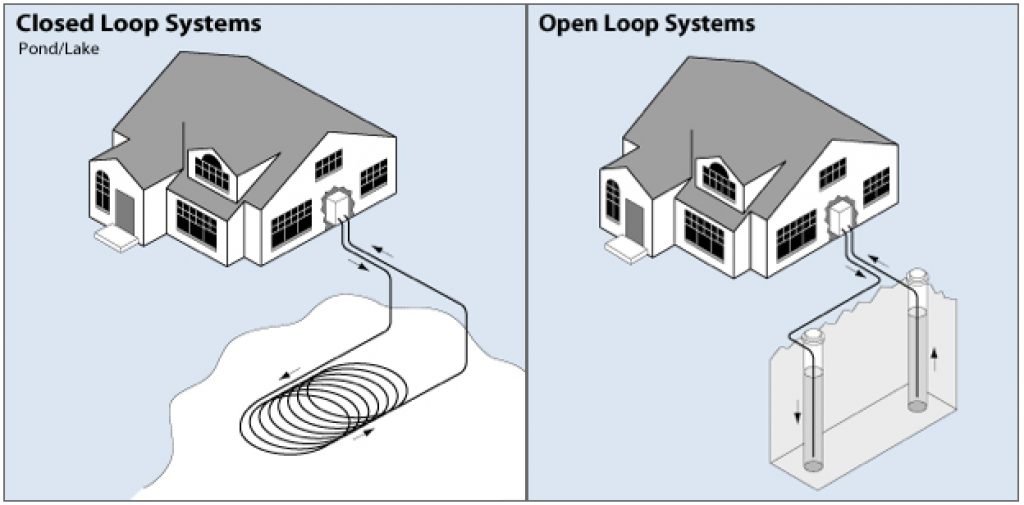
Source: A&H Drilling
These systems take advantage of underground water sources like wells or water deposits. These subterranean ponds can reach around 68°F depending on your geographical location.
An open-loop system pumps the water up into the heat exchange before pumping it back into the pool. Finally, the water leaves the pipeline and is warmed naturally by the earth again.
This system is less common and requires more maintenance as minerals from the water can clog up the system.
Lake Systems
Not to be confused with an open-loop system, lake systems are a variation of closed-loop systems.
Instead of the system absorbing heat directly from the earth, the water is heated by geothermal pools. These surface pools can reach temperatures of 99 to 102°F. While this sounds much better than an open system, not everyone has access to these hot springs.
The pipeline is laid out and coils through the lake, which absorbs heat through conduction. Again, the heat is transferred to the exchange and then back through the pipeline to the pool.
Hybrid Systems
As the name suggests, hybrid systems combine two or more systems. For example, geothermal and air heat pumps can be connected to a heat exchange. Alternatively, water from an underground well can be pumped onto your roof and warmed by solar radiation.
Do Systems Have Different Lifespans?
Since each system has a different process, they will have different (yet similar) lifespans.
For example, mineral deposits might affect the pipeline of an open system. On the other hand, tree roots and earth movement might damage a closed system and cause leaks.
You can expect your geothermal heat pump to last 15 years. With proper care and maintenance, this can be extended to 25 years. After this period, parts of the system will need to be replaced.
What Factors Affect A Geothermal Heat Pumps Lifespan?
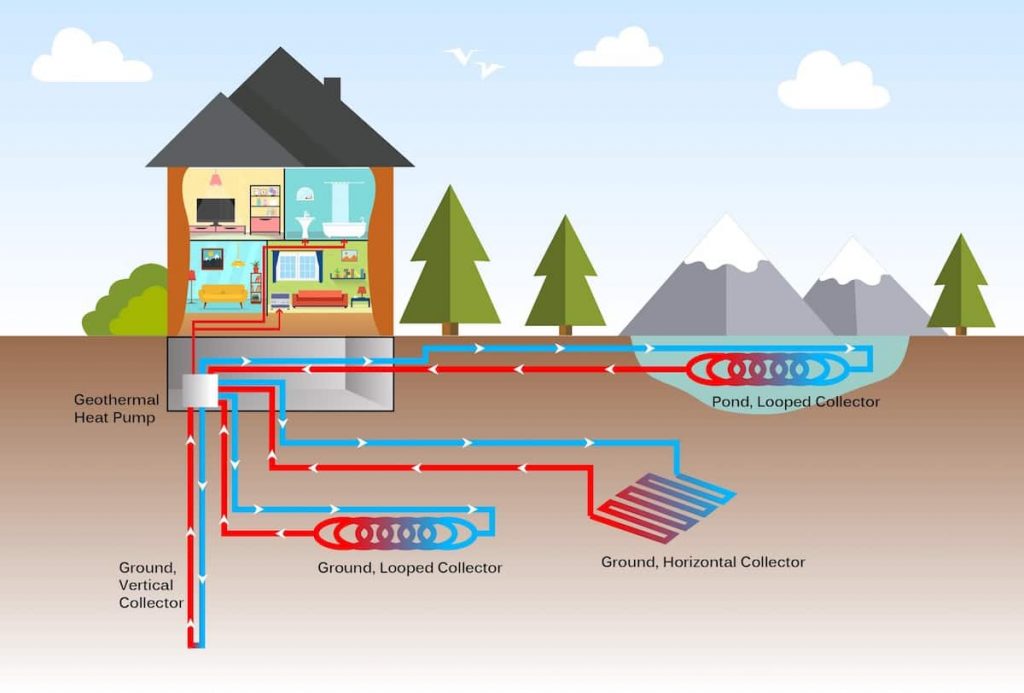
Source: everysolarthing
That being said, some factors can influence a geothermal heat pump’s lifespan. These issues might not create a need to replace the pump, but you will need to replace some parts.
Most of these factors only influence the pipeline, meaning you’ll only need to replace pipes. However, this is easier said than done. First, you’ll need to remove the whole system and search for the leak manually to fix a section.
Here are 3 factors that influence geothermal pump lifespans:
- Roots and rodents
- Earth movement
- Mineral deposits
Roots And Rodents
Roots and Rodents can damage all types of geothermal heat pump systems. For example, roots can burrow into underwater wells and damage your pipeline. Additionally, trees with widespread roots may damage pipes closer to the surface.
Secondly, rodents such as rats or moles can burrow into the pipes, sensing the water inside them. As a result, they can chew and gnaw at the pipeline, causing leaks in the pipes. While leaks aren’t detrimental to open systems, closed systems will be significantly affected.
You can place your pipeline far away from any trees to avoid this. Additionally, the deeper you place the pipes, the less you have to worry about roots and rodents.
A bonus is that the earth is typically warmer the deeper you go.
Earth Movement
The ground around us shifts all the time. For example, clay soil expands and contracts during rainy and dry seasons, and some countries are prone to earthquakes.
The movement of the soil can cause debris like rocks to rub against the pipes of your system. This can damage the material and cause leaks.
Something to consider about open-looped systems is that they can cause the ground to collapse. For example, suppose an underground water deposit is drained too much (by an extensive system and low water level). In that case, the earth around it can collapse.
This can cause sinkholes and damage to your property. You’ll also lose the heat source for your pump, and your geothermal heat pump will no longer work.
Mineral Deposits
Another factor that influences the lifespan of your geothermal heat pump is hard water. Hard water contains minerals that have been deposited into the water from the soil around it. This problem only affects open-loop systems. However, if there is a leak in your lake system, the same issue may occur.
Minerals such as iron and manganese can cause mineral build-up in your pipes. Other common minerals include copper and calcium.
The easiest way to avoid this is to add a water softener to your system. While this will prevent mineral build-up, it will contaminate your underground water source.
How To Make A Geothermal Heat Pump Last Longer
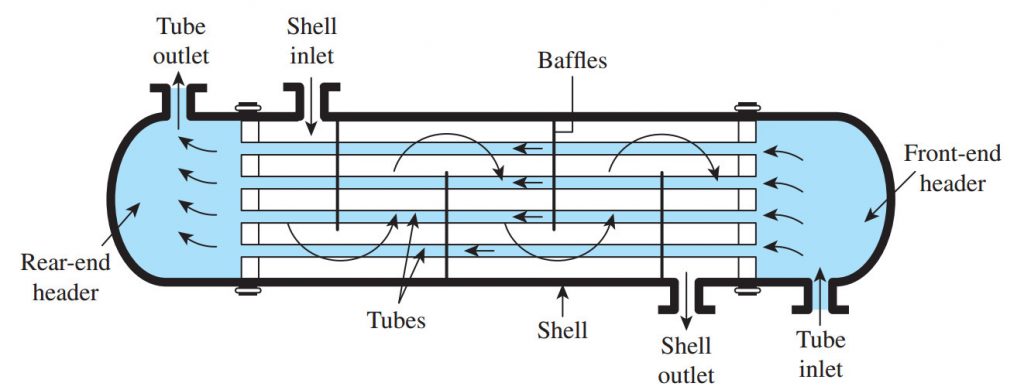
Source: thomasnet
When it comes to prolonging the lifespan of your heat pump, there are two components you should consider: the heat pump housing unit with the heat exchange and the pipes themselves.
There isn’t much you can do to prolong the pipes’ lifespan, but there are some tips for the exchange unit.
Tips To Make Increase Your Geothermal Heat Pump’s Lifespan
Use The Right Chemicals
To help the heat exchange work at peak efficiency, you must keep the heat transfer surface clean. Sometimes there’s scaling, sediment, or biological growth on the surface. Make sure you use the right chemicals for the job.
Replace Your Gaskets
You’ll need to change the gaskets regularly if you’re using a plate and frame heat exchange. Gaskets often start leaking if you don’t replace them, which will shorten the lifespan of your geothermal heat exchange system.
Remove Ice And Snow
If you live in a cold climate, you’ll need to ensure that your outside unit doesn’t freeze over. This can affect the water in the pipes and the heat exchange. Another alternative is to replace the water in your system with an antifreeze liquid.
Keep Your HVAC Fan Clean
If your heat exchange is linked to an air conditioning unit, ensure that you clean the filter out regularly. This will improve air quality and allow your system to run smoother.
Use Water Softener
You can add a water softener if you notice scaling and mineral build-up. This chemical breaks down the solid compounds and prevents build-up.
Only use a water softener in a closed-loop system. Using these chemicals can contaminate groundwater in an open-loop system.
Hire A Professional
Lastly, you can hire a professional maintenance man for heat exchange units. This is especially handy if you have a hybrid system.
The professional will know about each component and how to maintain them. You can call the manufacturer of your system to find out where the closest maintenance company is.
Final Thoughts
The typical geothermal heat pump lifespan is 20 to 25 years. But if you keep up with regular maintenance, you could add a couple more years.
At the end of the day, most machines have components exposed to different elements. In a lab environment, they could last much longer — while in reality, parts will need to be replaced to ensure efficiency. This is no exception for a geothermal heat pump.
We’ve looked at what factors may damage your water pipes and how to keep the heat exchange healthy. If you’re ever in doubt about how to clean a specific component, it’s always best to contact the manufacturer.
We hope that this article has answered your questions on the lifespan of a geothermal heat transfer.
We’d love you to join our community forum if you have any unanswered questions! Our experts will get to your inquiry ASAP, and other community members can share some insight!

